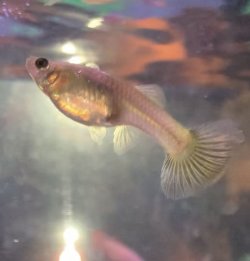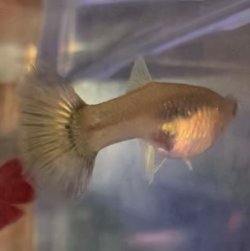My Guppy gave birth to 6 fry around a week ago. The fry are doing very well and all have survived so far. But I swear my guppy is still pregnant! Is this a normal thing for Guppies? She still has a round belly and I swear I can see some fry in there if I look closely near her gravid spot. You can’t really see the fry in the pictures though, my camera doesn’t really pick it up. Is this what guppies do sometimes, give birth to half of their fry and wait to give birth to the rest if they aren’t properly developed yet? I just assumed female Guppies gave birth to all of the fry when it is time. She is doing fine, she is active and has a good appetite. Cannot see any issues with her apart from her still carrying babies! ?
You are using an out of date browser. It may not display this or other websites correctly.
You should upgrade or use an alternative browser.
You should upgrade or use an alternative browser.
Guppy still pregnant after giving birth?
- Thread starter Dopatri
- Start date
yes, one time my guppy gave birth to fry 2 times!
Wow, I did not know this is a thing with Guppies. Amazing!yes, one time my guppy gave birth to fry 2 times!
maybe she did not finish ?Wow, I did not know this is a thing with Guppies. Amazing!
Yeah she mustn’t have finished, she sure is keeping me waiting for the next arrivals though. Hahamaybe she did not finish ?
it definetly looks like shes not fully pregnant but still has a big belly. maybe she is normally like this?Yeah she mustn’t have finished, she sure is keeping me waiting for the next arrivals though. Haha
may i ask what species she is? she is so gorgeous with her tail!!
Guppy females can hold up to 10 sperm packets. This means they can give birth 10 times every 28 days off of 1 mating.
Dajuyu
Fishaholic
Now having worms is indeed a bummer .... ermm means water condition is bad ?
Where worms and parasite can thrive ...
Where worms and parasite can thrive ...
Fish regularly have intestinal worms and it has nothing to do with a dirty aquarium. They normally get them at the breeders in Asia who feed the fish with live foods like Daphnia that are grown in sewer ponds. Sometimes the fish are grown in sewer ponds too.
Intestinal worms in fish are easy to treat and it's a good idea to treat all livebearers from Asia because they are just about always infested with them.
--------------------
INTESTINAL WORMS IN FISH
You can use Praziquantel to treat tapeworm and gill flukes. And Levamisole to treat thread/ round worms like Capillaria and Camallanus. If you can't find these medications, look for Flubendazole, which treats both lots of worms.
In the UK look for:
eSHa gdex contains praziquantel that treats tapeworm and gill flukes.
eSHa-ndx contains levamisole and treats thread/ round worms.
NT Labs Anti-fluke and Wormer contains flubendazole.
Remove carbon from filters before treatment and increase aeration/ surface turbulence to maximise oxygen levels in the water.
You treat the fish once a week for 4 weeks. The first treatment will kill any worms in the fish. The second, third and forth treatments kill any baby worms that hatch from eggs inside the fish's digestive tract.
Treat every fish tank in the house at the same time to prevent cross contamination.
You do a 75% water change and complete gravel clean 24-48 hours after treatment. Clean the filter 24 hours after treatment too.
Do not use the 2 medications together. If you want to treat both medications in a short space of time, use Praziquantel on day one. Do a 75% water change and gravel clean the substrate on day 2 & 3. Treat the tank with Levamisole on day 4 and do a 75% water change and gravel clean on day 5, 6 & 7 and then start with Praziquantel again on day 8.
The water changes will remove most of the medication so you don't overdose the fish the next time you treat them. The gravel cleaning will suck out any worms and eggs that have been expelled by the fish. Repeating the treatment for 3-4 doses at weekly intervals will kill any worms that hatch from eggs. At the end of the treatment you will have healthier fish.
Intestinal worms in fish are easy to treat and it's a good idea to treat all livebearers from Asia because they are just about always infested with them.
--------------------
INTESTINAL WORMS IN FISH
You can use Praziquantel to treat tapeworm and gill flukes. And Levamisole to treat thread/ round worms like Capillaria and Camallanus. If you can't find these medications, look for Flubendazole, which treats both lots of worms.
In the UK look for:
eSHa gdex contains praziquantel that treats tapeworm and gill flukes.
eSHa-ndx contains levamisole and treats thread/ round worms.
NT Labs Anti-fluke and Wormer contains flubendazole.
Remove carbon from filters before treatment and increase aeration/ surface turbulence to maximise oxygen levels in the water.
You treat the fish once a week for 4 weeks. The first treatment will kill any worms in the fish. The second, third and forth treatments kill any baby worms that hatch from eggs inside the fish's digestive tract.
Treat every fish tank in the house at the same time to prevent cross contamination.
You do a 75% water change and complete gravel clean 24-48 hours after treatment. Clean the filter 24 hours after treatment too.
Do not use the 2 medications together. If you want to treat both medications in a short space of time, use Praziquantel on day one. Do a 75% water change and gravel clean the substrate on day 2 & 3. Treat the tank with Levamisole on day 4 and do a 75% water change and gravel clean on day 5, 6 & 7 and then start with Praziquantel again on day 8.
The water changes will remove most of the medication so you don't overdose the fish the next time you treat them. The gravel cleaning will suck out any worms and eggs that have been expelled by the fish. Repeating the treatment for 3-4 doses at weekly intervals will kill any worms that hatch from eggs. At the end of the treatment you will have healthier fish.
Well, she can still be pregnant. if she is, it mean that the first borns were having more nutrients in the egg. Those will develop faster than the ones with les nutrients in the egg. When pre-fertilization happens (this means that the female provides her eggs with nutrients before the eggs will be fertilized), the amount of nutrients will be equal in each egg. But it does happen that there will be eggs with more or less nutrients in comparison to other eggs. Those with significantly less nutrients will be undeveloped. Those will never become fully developed ones. Those with significantly more nutrients will develop faster and will be born sooner in relation to the rest of the developing embryos. This has got nothing to do with superfetation, to be clear on this. For there are people that think that this is the same as superfetation. Because all eggs are fertilized at the same time, one can not speak of superfetation.
But back to the subject... still being pregnant after giving birth to a few fry, is quite normal. So, they don't always drop all fry in one day. But mostly they will drop them in one day.
But back to the subject... still being pregnant after giving birth to a few fry, is quite normal. So, they don't always drop all fry in one day. But mostly they will drop them in one day.
Similar threads
- Replies
- 12
- Views
- 955
- Replies
- 2
- Views
- 520
- Replies
- 3
- Views
- 1K
- Replies
- 10
- Views
- 685




